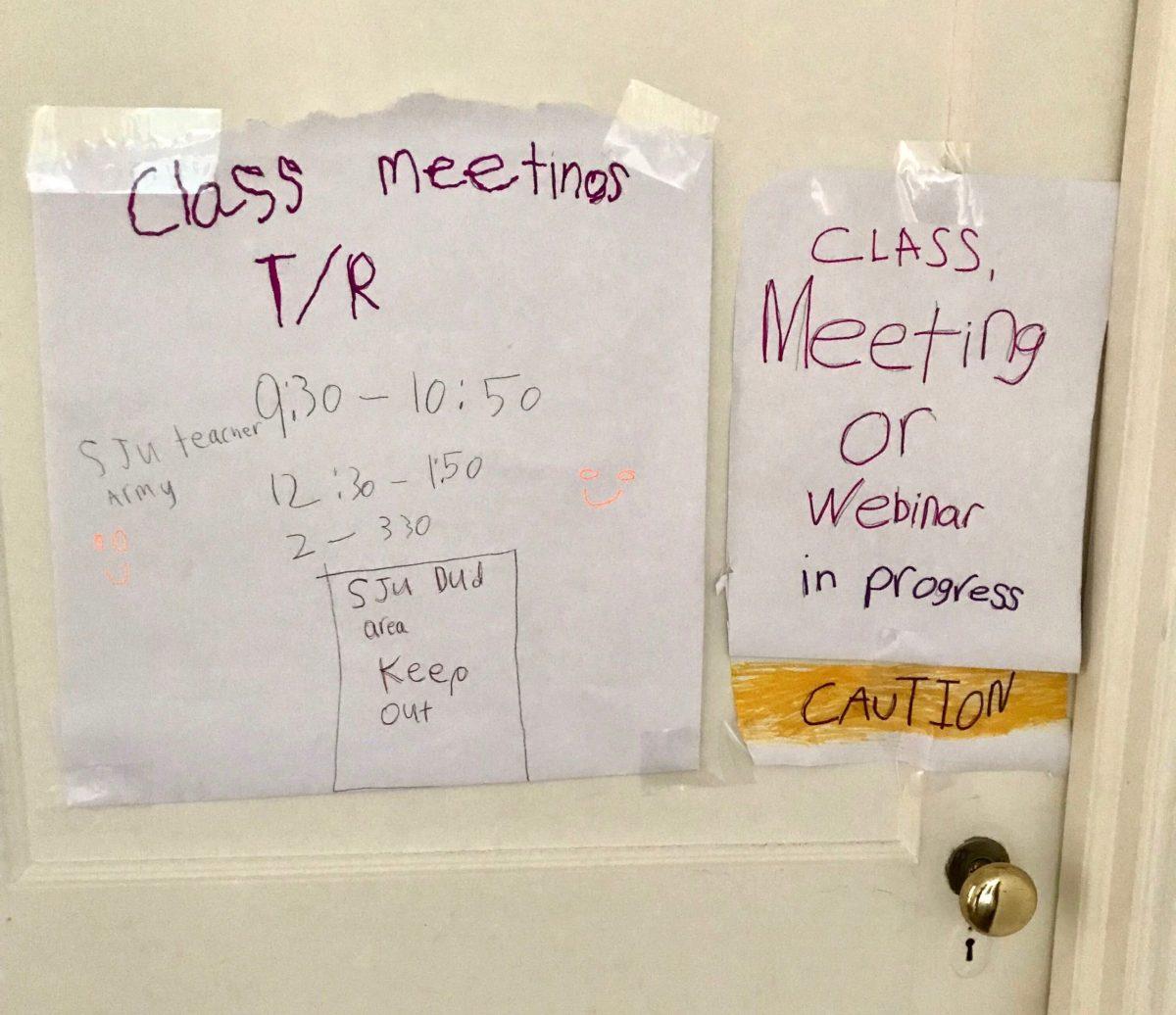Kay Cosgrove, Ph.D., professor of English, is currently adjusting her three sections of English 102 to online instruction, virtually advising three graduate students on their theses for the masters program and creating daily lesson plans for her four- and two-year-old children.
In order to get any work done, Cosgrove and her husband match schedules to determine who can watch the children when the other is working.
However, that doesn’t stop Mary, Cosgrove’s four year old, from running into her office to show her mom’s class a page of stickers she had put together that day.
“That was fine and funny, and it paused our conversation and then we went right back to it,” Cosgrove said. “One of my students sent me a little side chat and said she’s so cute. It’s nice, actually, in a way that the children bring comic relief to what is sort of a bad way to end our time together on campus.”
Cosgrove is just one of many St. Joe’s faculty members who must work from home while taking care of children during the coronavirus pandemic.
Although Kristen Grimes, Ph.D., professor of Italian, has a sign on her office door when her Zoom classes are in session, her kids in kindergarten, third grade and eighth grade still love to pop in to see her students.
“They love to see college students,” Grimes said. “They’ll sit outside my office door and listen to my Zoom session and try to come in. The students generally seem to not mind, but even if they do, they’re very, very kind about it and understanding and patient.”
Like most students, fellow colleagues have been just as supportive when the lines between home and work life are blurred, according to Ann Marie Jursca Keffer, director of the Faith-Justice Institute.
“The first couple of Zoom calls my four year old, no matter what, would sneak away and wind up looking into my Zoom call,” Keffer said. “Bringing a four year old colleague on the call, there’s no there’s no real downsides. Thankfully, I work in a great community.”
Grimes also said it is not only her younger kids who need support while practicing distance learning due to school closures.
“It’s really frustrating because the teenagers, I think, need more structure than anybody,” Grimes said. “Almost everything [my daughter’s] doing is asynchronous, and it means that she can be up until four in the morning and sleep all day. She’s just attached to her computer. It’s [frustrating]. But we’re working on the schedule.”
Despite closures of daycares and schools, some St. Joe’s community members still have access to essential childcare. Rachael Sullivan, Ph.D., professor of communications and media studies, said it would be nearly impossible to get her work done without a nanny for her 20 month old.
Sullivan’s husband works in an ER department and could have to go into a meeting at any time.
“[Our nanny] has been self quarantining,” Sullivan said. “It has definitely been a risk we had to talk about. Your schedule is your child’s schedule. You don’t have another schedule. If your child doesn’t nap, your only downtime is gone. You are going from 7 a.m. to 7 p.m. nonstop unless your spouse can take over.”
Similarly, Steven Hammer, Ph.D., assistant professor of communication and media studies, still has a nurse come in part time to care for his son, Rowan, who has “severe high needs” due to his disabilities. Hammer said Rowan needs 24/7 care and typically goes to Widener Memorial School where he receives different therapies to help treat his disabilities.
“The therapists are what really make school important for Rowan, and none of that happens virtually,” Hammer said. “I can replicate a lot of that at home because I have adaptive equipment, but I don’t have access to his therapists.”
Hammer’s classes mostly center around making St. Joe’s accessible for people of all ability levels. Although his classes are not as effective virtually, like mapping St. Joe’s campus to be more accessible, he is incorporating Rowan into his classes.
“Instead of working with folks at Kinney, my students will be designing speculative instruments for my son,” Hammer said. “They get to meet him, they get to see him on Zoom and see the kind of adaptive equipment he has. They can design and I can test with my son.”
Hammer said in order to maintain balance in his personal life, he makes sure to include time to socialize with other adults.
“Around 9 or 10, I will kind of have a lot of my social time,” Hammer said. “I have three different friends across the country right now that I am watching Netflix shows with, so we will get on Zoom.”
In order to keep balance in her home, Grimes tries to get her family outside as much as possible.
“We like seeing the spring, how the flowers are growing, how everything’s coming back to life and how it’s a positive sign that this will eventually end,” Grimes said.
Grimes said in times like the pandemic, she is reminded of why she decided to work at St. Joe’s.
“Everyone seems to be really pulling together,” Grimes said. “The students are truly kind and just really great people. I think that will carry us through for sure.”


















































